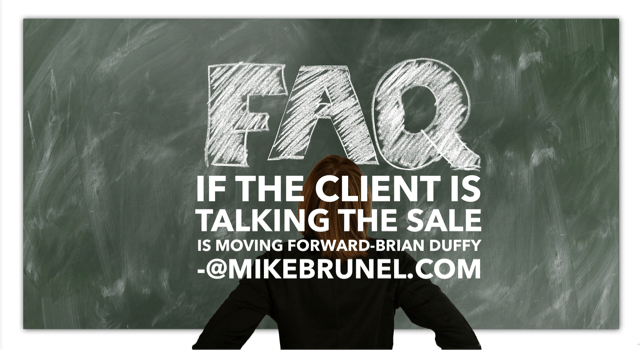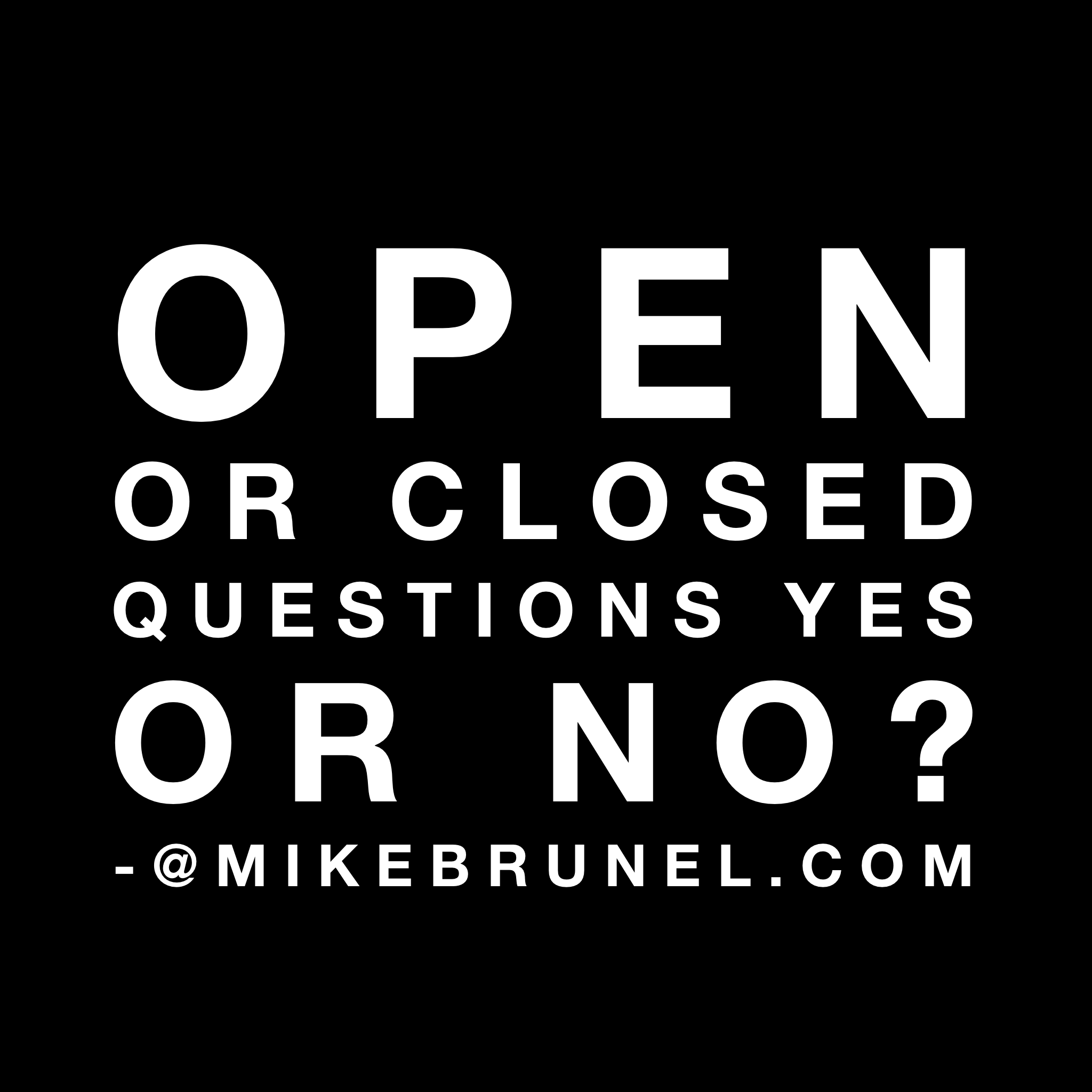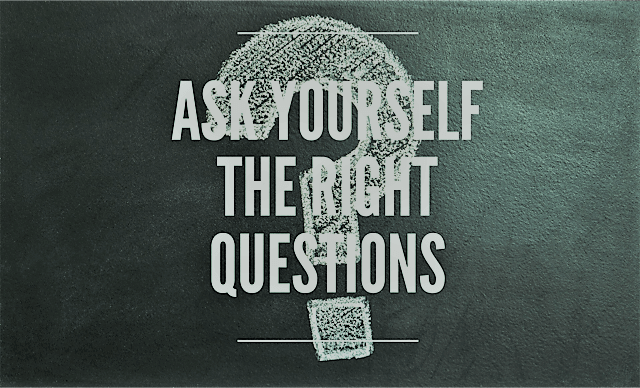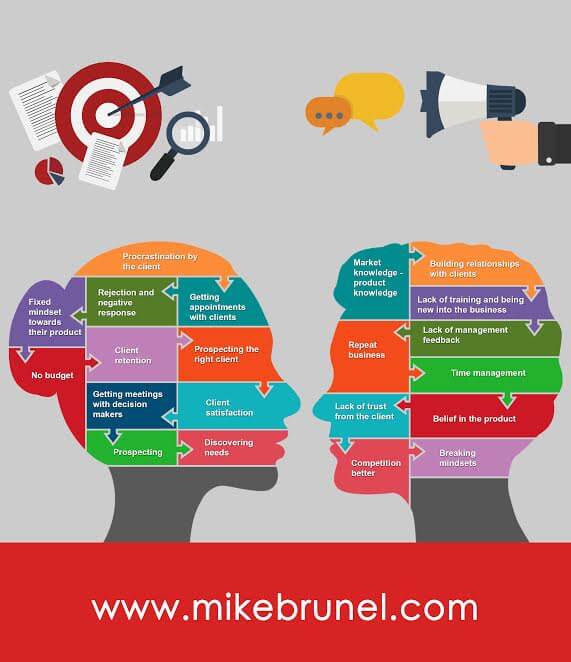by Mike Brunel | Nov 29, 2017 | Strategy, Uncategorized

Keep your clients talking
The Right Questions
Over the last two weeks, the theme of my blogs has been questions. The ones we ask ourselves and the one we ask others.
Many people struggle with sales because they think selling means using the tricks and techniques that slick salespeople use.
Until we figure out what the client is thinking, however, we make little progress.
This was certainly true in my business. Once we stopped selling our stuff up front, things got a lot easier. We had to work hard on constructing the right questions to ask, but after that, the process flowed.
Keep ’Em Talking
If you want to have a discussion with someone about a service that you offer or a product you sell, isn’t it better to ask questions that keep the exchange flowing? Wouldn’t you agree?
Questions change the progression of a sale. They move it forward to a conclusion. One of my mentors, Brian Duffy, used to drum it into me over and over again. “If the client is talking, the sale is moving forward,” he’d say. “If you don’t shut up, it isn’t!”
How do you ask the right questions?
In my book, I explain the difference between what I call “Can I help you” questions and “Open them up for a discussion” questions. Some people refer to them as closed-ended and open-ended questions. By analysing the distinction, you will see why you might be losing clients.
“Can I Help You” or Closed-Ended Questions
Definition: If you can answer a question with only a “yes” or “no” response, then you are answering a close-ended type of
question. Examples of close-ended questions are:
• Can I help you?
• Is that your final answer?
• Should I call her and sort things out?
• Can I help you with that?
• Would you like to go to the movies tonight?
• Is science your favourite subject?
• Are you interested?
• Are you happy with your purchase options?
• Are you just looking?
• Hi.
• Just let me know if you need anything.
Unfortunately, these questions often shut down the conversation. There are exceptions, but in general, closed-ended questions don’t allow you to uncover your customer’s concerns.
In my next blog I will talk about Open-ended questions, these are designed to open up the conversation. and allow you to find out your clients problems much faster.
 Mike Brunel started mikebrunel.com after being a successful entrepreneur and founder of NRS Media. He co-founded NRS Media in Wellington, New Zealand, expanded it into a global powerhouse in media sales and training, and was eventually responsible for opening offices in London, Atlanta, Toronto, Sydney, Capetown, and Bogota. His products and services are now sold in 23 countries and in 11 languages generating $350 million annually in sales for his clients. Mike sold the company in 2015 and now spends his time following his passions which include rugby, travel. His promise: “I can find thousands of dollars in your business within minutes – GUARANTEED” TRY ME OUT!
Mike Brunel started mikebrunel.com after being a successful entrepreneur and founder of NRS Media. He co-founded NRS Media in Wellington, New Zealand, expanded it into a global powerhouse in media sales and training, and was eventually responsible for opening offices in London, Atlanta, Toronto, Sydney, Capetown, and Bogota. His products and services are now sold in 23 countries and in 11 languages generating $350 million annually in sales for his clients. Mike sold the company in 2015 and now spends his time following his passions which include rugby, travel. His promise: “I can find thousands of dollars in your business within minutes – GUARANTEED” TRY ME OUT!
by Mike Brunel | Nov 21, 2017 | Sales
 How do you train your salespeople to have fun selling?
How do you train your salespeople to have fun selling?
People can learn to ask open-ended questions. There’s a great exercise I do with salespeople, called “What’s in my pocket?” It was taught to me by one of my best staff members—and best friends—at NRS Media, Stephen Pead.
In a training session, you secretly put something unusual in your pocket. Be careful not to choose objects that are too easy to guess, like keys or a handkerchief. Instead, pocket something slightly out of the ordinary, like a wedding ring or a bottle top.
What’s an Open Question?
In the setup, clearly, explain the difference between open and closed questions. Open questions invite discussion, while closed questions usually elicit a “no” answer.
The team is instructed to ask 10 closed questions first to try to identify what’s in your pocket. As a trainer, you can only answer “yes” or “no”. The team never guesses it this way.
Open questions are the next part of the exercise. Have the trainees ask 10 open questions to ascertain the treasure you have hidden away.
What’s a Closed Question?
Example of a closed question might be, “What do you have in your pocket, is it useful?”
The answer is either, “Yes, it is useful,” or “No, it is not useful.” That response doesn’t get you a lot of information.
An open question might be, “What can you do with the object?”
You can answer these questions any way you like. Most of the time, the salespeople get it right within five or six questions.
The answer to this type of question will give you a lot more to go on. Just switching up a few words makes all the difference. Constructing good questions pays off, but people are reluctant to take the time to develop them.
Asking open questions might make some folks feel stupid, weak, or uncertain. My challenge to any salesperson is to assume leadership around asking the right questions.
Model it for your staff. Take the time to train them. Your team must understand that the client is not always ready to buy.
Sometimes you have to have a conversation to get them alongside. Salespeople need to know—and practice— the difference between open and closed questions long before the customer walks in the door.
ABOUT THE AUTHOR.
 Mike Brunel started Mikebrunel.com after being a successful entrepreneur and founder of NRS Media. He co-founded NRS Media in Wellington, New Zealand, expanded it into a global powerhouse in media sales and training, and was eventually responsible for opening offices in London, Atlanta, Toronto, Sydney, Capetown, and Bogota. His products and services are now sold in 23 countries and in 11 languages generating $350 million annually in sales for his clients. Mike sold the company in 2015 and now spends his time following his passions which include rugby, travel. His promise: “I can find thousands of dollars in your business within minutes – GUARANTEED” TRY ME OUT!
Mike Brunel started Mikebrunel.com after being a successful entrepreneur and founder of NRS Media. He co-founded NRS Media in Wellington, New Zealand, expanded it into a global powerhouse in media sales and training, and was eventually responsible for opening offices in London, Atlanta, Toronto, Sydney, Capetown, and Bogota. His products and services are now sold in 23 countries and in 11 languages generating $350 million annually in sales for his clients. Mike sold the company in 2015 and now spends his time following his passions which include rugby, travel. His promise: “I can find thousands of dollars in your business within minutes – GUARANTEED” TRY ME OUT!
by Mike Brunel | Nov 13, 2017 | Sales, Strategy

Ask yourself these Powerful Questions.
Last week I talked about the importance of asking yourself powerful questions when it comes to conditioning your mindset.
To finish off that discussion here are some business questions you might want to think about as you move into another week of selling.
• What am I most happy/excited about in my business?
• What am I most proud of in my business?
• How does it make me feel to employ other people?
• What am I committed to doing to improve sales
systems?
• How/why do I value my customers?
Set up Systems
With all of these questions, you are asking yourself about your business is it not the time to set up systems to routinize these questions for your sales team so their conversations with customers flow more naturally? Efficiency is especially important with today’s shorter buying cycles and your clients are considering several competitive offers at any one time; there is little time to waste.
What does a quality question look like in practice? A quality question is one that cannot be answered with a simple “No.” Can I help you is the wrong question, because “No, just looking” is not the answer you want? Where can you go from there? Nowhere.
The phrase that you thought was helpful has just shut down the conversation you were hoping to have with a potential client. Is it hard to come back from a dead end? You bet.
The Other Guy’s Shoes
How do you get your sales team to open up the conversation? Get them to think about the customer’s experience. Many salespeople are concerned about coming across as nosy. In reality, there are few topics that are truly off-limits. Obviously, you wouldn’t ask anything too personal, but if you genuinely indicate your desire to help, people are quite willing to talk about themselves.
Keep in mind that the customer’s most urgent need at the moment he or she walks in your door may not be to buy your
product.
It may be something much more basic, like a need to be understood. Before they buy anything, they may want to know that you appreciate them.
The importance of considering the customer’s current circumstances is succinctly told in a famous sales story, called The Man in the Desert.* It goes like this: A man comes into a store after living in the desert for months. The store sells best quality food and clothing, but those are not the first things the customer needs.
What he needs is water. The best conversation starter for this man is a glass of water. Maybe after his thirst is quenched, you will learn that he also needs lunch or a new jacket. He might need other things to help him feel better.
If you sell those things, you are in business. You have opened a dialogue that would never have taken place if you had not recognised the customer’s most basic need.
So many people stop at the glass of water. You almost always have to ask more than one question to find out what the client wants. If that person says, “I’m just looking,” you can respect that, but you know they must have come in for a reason. Have the courage to ask another question.
For example, if someone is looking at a product, ask them what they like about it. Get them talking. The only questions that don’t work are questions that close the conversation.
Of course, for a salesperson to be willing to let the conversation wander, he or she must be prepared with the things we talked about earlier, including sufficient knowledge of the product to confidently answer any questions that come back from the customer.
If you know your product well enough, the answers come intuitively, which makes a sales interaction feel more like a friendly chat.
Have a good week selling your stuff.
Mike
PS. Have you tried the 7 Day Challenge yet? It’s easy and it is FREE.
ABOUT THE AUTHOR.
 Mike Brunel started Mikebrunel.com after being a successful entrepreneur and founder of NRS Media. He co-founded NRS Media in Wellington, New Zealand, expanded it into a global powerhouse in media sales and training, and was eventually responsible for opening offices in London, Atlanta, Toronto, Sydney, Capetown, and Bogota. His products and services are now sold in 23 countries and in 11 languages generating $250 million annually in sales for his clients. Mike sold the company in 2015 and now spends his time following his passions which include rugby, travel. His promise: “I can find thousands of dollars in your business within minutes – GUARANTEED” TRY ME OUT!
Mike Brunel started Mikebrunel.com after being a successful entrepreneur and founder of NRS Media. He co-founded NRS Media in Wellington, New Zealand, expanded it into a global powerhouse in media sales and training, and was eventually responsible for opening offices in London, Atlanta, Toronto, Sydney, Capetown, and Bogota. His products and services are now sold in 23 countries and in 11 languages generating $250 million annually in sales for his clients. Mike sold the company in 2015 and now spends his time following his passions which include rugby, travel. His promise: “I can find thousands of dollars in your business within minutes – GUARANTEED” TRY ME OUT!
*KipTindall. The Container Store.
by Mike Brunel | Nov 6, 2017 | Leadership, Sales

Start a Conversation with Yourself
A successful sales relationship hinges on the ongoing conversation you have with your customer. The dialogue starts, strangely enough, with the conversation you have with yourself.
You can listen to others more effectively when you know how to listen to yourself. I first learned this years ago at that first media company job.
They sent me to a conference in Houston, Texas. I had just come out of a long-term relationship and to be totally honest, I felt a little bit lost.
I remember sitting in a hotel room and coming across an infomercial featuring a very youthful Tony Robbins promoting something he called “Personal Power.”
I was intrigued enough to buy what Robbins was selling. When I got back to New Zealand, there was a box waiting for me with Tony’s signature on it.
Love of Knowledge.
I devoured the material; it re-ignited my love of knowledge and showed me how to improve my outlook and my self-talk.
I did all the exercises and kept a journal. One skill I learned was how to ask quality questions of myself. It started with questions recorded in a journal and culminated in a completely new focus that brought better results. The disparity in the quality of people’s lives often comes down to the difference in the questions they consistently ask.
You prime your mental computer to look for a particular type of answer. If you’re asking, “What’s wrong with me,” your mind will come up with an answer—you are stupid or you don’t deserve to do well.
On the flip side, if you ask questions like “How can I take this experience and use it to contribute to others’ lives,” your brain will come up with much more constructive answers.
You will be able to see the path forward, rather than feeling like you have reached a dead end.
Conversation Questions to help your Self Talk
Here are some examples from my long-ago journal:
• What am I happy about in my life right now?
• What about that makes me happy and how does it
make me feel?
• What am I most excited about in my life right now?
• What makes me excited?
• What am I grateful for in my life?
• What am I committed to in my life right now?
Conversations Matter.
Asking these questions helped me see clearly how positive questions lead to a growth mindset, which leads to better results down the road. When you think in terms of constructive, positive questions, your brain goes off and works on
them even when you’re not thinking about the answers consciously.
For example, consider the difference between “Why does this always happen to me?” and “How can I learn from
this experience?” They are simply worlds apart in terms of choosing your next step.
Develop a pattern of questions that empower you. If you seek a shift in your life, make this part of your daily routine.
Over time, asking these types of questions changes how you question your clients.
Have fun selling your stuff.
 Mike Brunel started Mikebrunel.com after being a successful entrepreneur and founder of NRS Media. He co-founded NRS Media in Wellington, New Zealand, expanded it into a global powerhouse in media sales and training, and was eventually responsible for opening offices in London, Atlanta, Toronto, Sydney, Capetown, and Bogota. His products and services are now sold in 23 countries and in 11 languages generating $250 million annually in sales for his clients. Mike sold the company in 2015 and now spends his time following his passions which include rugby, travel. His promise: “I can find thousands of dollars in your business within minutes – GUARANTEED” TRY ME OUT!
Mike Brunel started Mikebrunel.com after being a successful entrepreneur and founder of NRS Media. He co-founded NRS Media in Wellington, New Zealand, expanded it into a global powerhouse in media sales and training, and was eventually responsible for opening offices in London, Atlanta, Toronto, Sydney, Capetown, and Bogota. His products and services are now sold in 23 countries and in 11 languages generating $250 million annually in sales for his clients. Mike sold the company in 2015 and now spends his time following his passions which include rugby, travel. His promise: “I can find thousands of dollars in your business within minutes – GUARANTEED” TRY ME OUT!

 Mike Brunel started mikebrunel.com after being a successful entrepreneur and founder of NRS Media. He co-founded NRS Media in Wellington, New Zealand, expanded it into a global powerhouse in media sales and training, and was eventually responsible for opening offices in London, Atlanta, Toronto, Sydney, Capetown, and Bogota. His products and services are now sold in 23 countries and in 11 languages generating $350 million annually in sales for his clients. Mike sold the company in 2015 and now spends his time following his passions which include rugby, travel. His promise: “I can find thousands of dollars in your business within minutes – GUARANTEED” TRY ME OUT!
Mike Brunel started mikebrunel.com after being a successful entrepreneur and founder of NRS Media. He co-founded NRS Media in Wellington, New Zealand, expanded it into a global powerhouse in media sales and training, and was eventually responsible for opening offices in London, Atlanta, Toronto, Sydney, Capetown, and Bogota. His products and services are now sold in 23 countries and in 11 languages generating $350 million annually in sales for his clients. Mike sold the company in 2015 and now spends his time following his passions which include rugby, travel. His promise: “I can find thousands of dollars in your business within minutes – GUARANTEED” TRY ME OUT! 
 How do you train your salespeople to have fun selling?
How do you train your salespeople to have fun selling?
